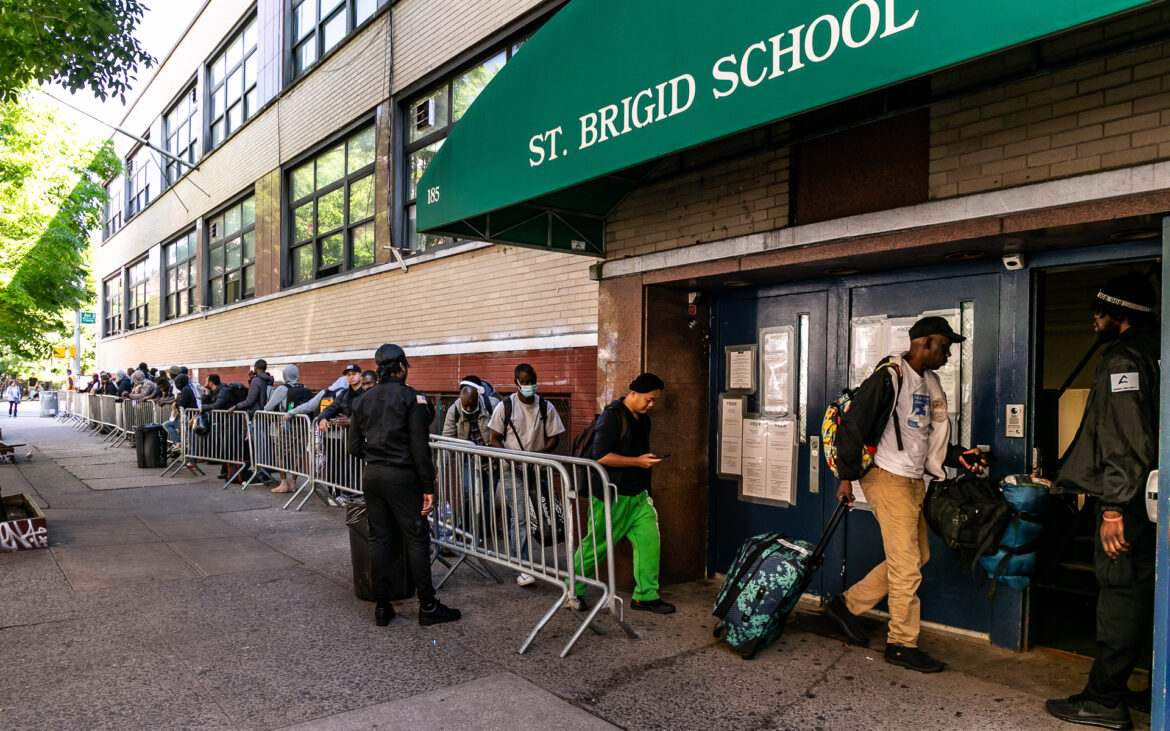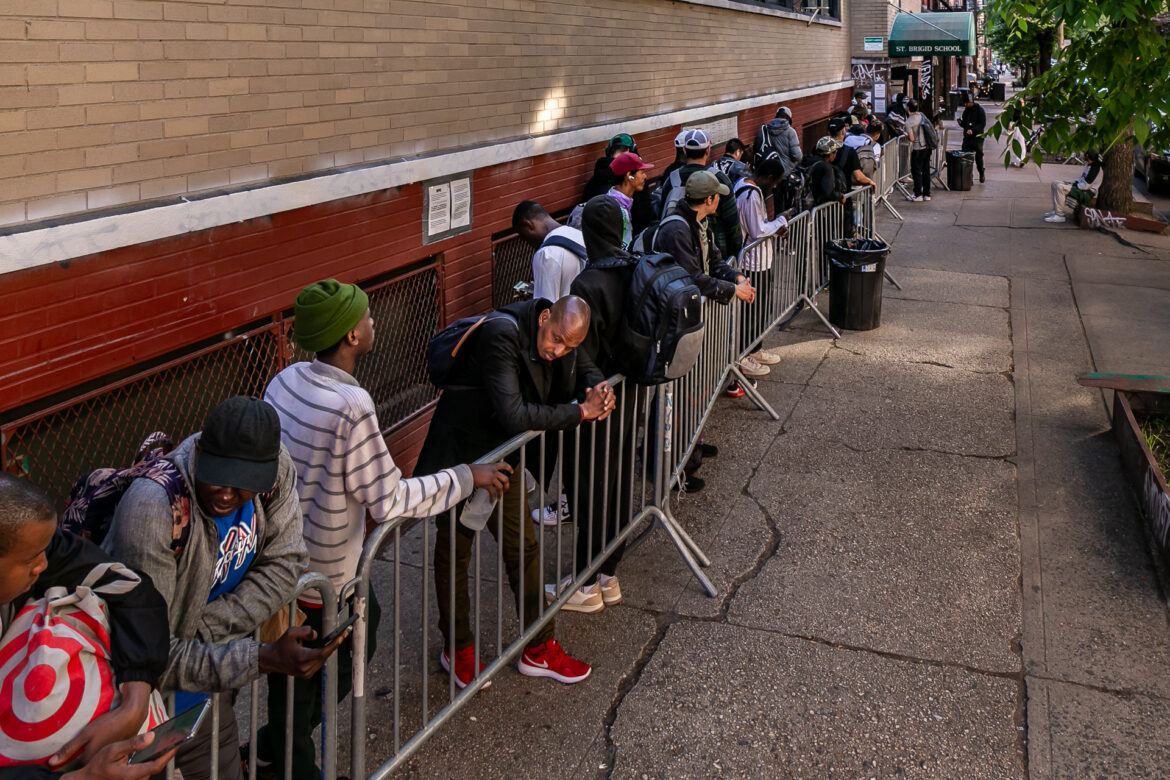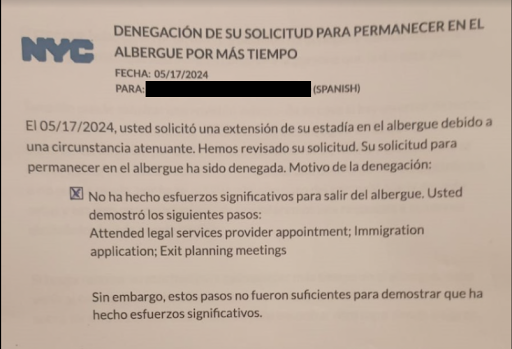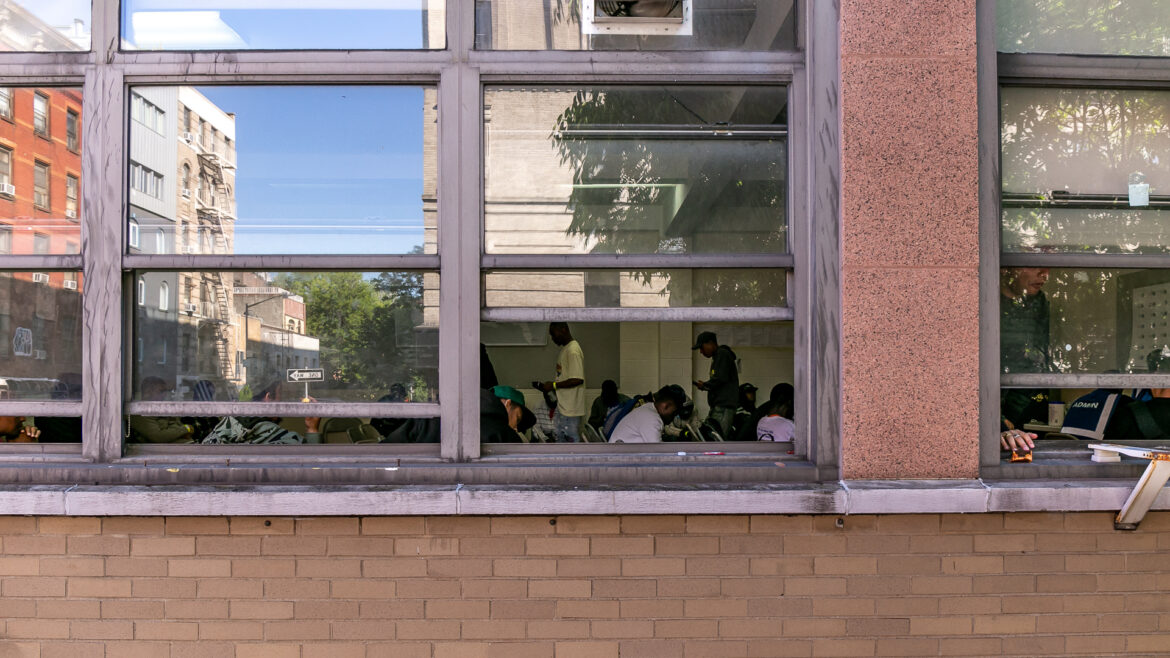“For people who are receiving denials, but are accessing legal services, they’re going to be able to have some kind of advocacy,” said Deborah Berkman at New York Legal Assistance Group. “Without legal services, it seems almost impossible.”

Adi Talwar
Migrants waiting in line in front of the city’s “Reticketing Center” in the East Village on May 22, 2024.The city began rolling out stricter rules for migrant shelter reapplications this week, which make it tougher for adults without children to earn more time.
The changes are part of a legal settlement reached in March that temporarily redefined New York’s decades-old right-to-shelter policy, which generally requires the city to provide a bed to anyone who needs and requests it. Adult migrants without children whose time of stay has expired after an initial 30 or 60 days now need to prove they meet “extenuating circumstances” to qualify for an extension.
Since the Spring of 2022, nearly 200,000 migrants and asylum seekers have arrived in New York City and about 65,000 are currently in the shelter system. Last July, the city began issuing controversial time limits to adults without children, extending the policy to families with kids in January, though with the option to reapply at the end of each deadline. Families with children are exempt from the new, stricter criteria.
“We have very limited tools for how we continue to manage,” Mayor Eric Adams’ Chief of Staff, Camille Joseph Varlack, told reporters during a press briefing Tuesday. “Every single week we still get hundreds, if not thousands of people coming into the system. We need to make sure that we have the space to take care of the new guests that are coming into the city as well.”
Officials said last week that they’d issued an initial 6,500 30- or 60-day shelter eviction notices under the new rules, 200 of which had deadlines that hit Wednesday. Those seeking more time were directed to the city’s Reticketing Center, based at the former St. Brigid’s School in the East Village, where they could make their case for an extension.
City Hall didn’t provide numbers on how many reapplicants received denials under the new terms, saying Thursday they were still processing the data. In the meantime, advocates and legal providers are keeping a watchful eye, saying they want to make sure the city is giving each person’s case careful consideration.
“We’re kind of working in the dark…about how to support young people in this process, because there’s been so little information from City Hall about how people are actually being assessed for extenuating circumstances,” said Jamie Powlovich, the director of the Coalition for Homeless Youth.
Some of the “extenuating circumstances” can generally earn someone an automatic extension: if they’ve signed a lease that starts soon; have an immigration proceeding, serious medical procedure or plans to leave the city within a month; are recovering from a medical procedure that impacts their ability to leave shelter, or are 18 to 20 years old and enrolled full time in high school. But others are less clear cut.

Adi Talwar
The line outside St. Brigid’s in the East Village, where migrants can reapply for shelter or tickets out of town, on the morning of May 22, 2024.Applicants can also show they’ve made “significant efforts” to leave shelter, such as if they’ve applied for Temporary Protected Status, are attending college or English classes, are looking for a job or already have one, among other scenarios.
The city has evaluated those cases so far using a 20-point system, in which someone can earn points for each effort they prove. But the system is still being negotiated and could change, according to Josh Goldfein, an attorney at the Legal Aid Society.
He and other advocates are concerned because neither they nor migrants know exactly how those efforts will be weighed, and complained about the lack of clarity.
They have also heard from migrants that the city’s process of determining whether to renew has moved quickly, raising questions about how much time applicants are being given to make their case.
“If the process goes quickly, and people are extended, then that’s fine. But if it goes quickly, and people are denied, and they did have relevant information to share, but the city didn’t take the time to gather it, then that’s a major concern,” Goldfein said.
When the city denies a request, it does so in a letter that should be issued in the preferred language of the immigrant, stating the reason for the denial. At least one letter shared with City Limits was written mostly in Spanish, but included one line in English.

“It’s a legal problem, and it’s like a practical problem,” said Deborah Berkman, project director* of the Shelter Advocacy Initiative at New York Legal Assistance Group (NYLAG).
To date, NYLAG has successfully intervened—with the advocacy of the Legal Aid Society—to help two migrants get extensions after initial denials. Legal Aid assisted another three in getting more time.
But the appeal process, in which migrants can request an independent review of their decision, could pose a hurdle to some, advocates noted. The city advises those who can’t file their appeal via email to “please notify the staff person who gave you this notice, and they will assist you,” according to a denial letter shared with City Limits.
“A lot of my clients who are new immigrants are not able to read,” Berkman explained. “If they hadn’t been able to be in touch with a legal services provider, it’s very unlikely that they would have had a place to sleep tonight.”
Both the Legal Aid Society and NYLAG said they don’t know how many people have received denials, and they’re only learning about these cases because migrants are contacting them.
“For people who are receiving denials, but are accessing legal services, they’re going to be able to have some kind of advocacy,” Berkman said. “Without legal services, it seems almost impossible, which I think makes it harder for us to know the number of people because unless they’ve come to us, we don’t know that they’re there. We don’t know that they’re being denied and then left outside.”
The thousands of migrants first impacted by the changes have been given a letter describing the new system, telling them to make a plan to move out of shelter and providing them with a resource guide, officials said last week.

Adi Talwar
A window outside St Brigid’s School, where newly arrived immigrants can queue up to request more time in shelter.“Everyone after May 27 who’s come into our system will be subjected to this process,” Joseph Varlack told reporters on May 17.
Outside the Reticketing Center Wednesday morning, City Limits spoke to roughly a dozen migrants, none of whom said they had heard yet of the new settlement rules, or the evidence they must collect to extend their stays going forward.
Marlon Ronquillo, 43, said he was asked a few questions when reapplying, such as if he had a family member in the country, if he could stay with someone else, or if he wanted to leave the city. After answering no to those queries and waiting a couple of hours, he received shelter for an additional 30 days.
“They imply that the city is no longer going to help you, as if they will not give you any more shelter,” Ronquillo said in Spanish. “As if this is the last time.”
*This piece has been updated since original publication to reflect Berkman’s new title.
To reach the reporter behind this story, contact Daniel@citylimits.org. To reach the editor, contact Jeanmarie@citylimits.org
Want to republish this story? Find City Limits’ reprint policy here.








